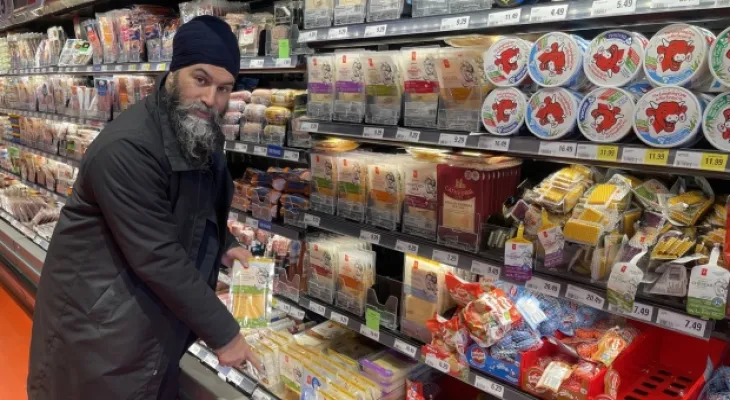Search here
Newspaper
Search here

Arab Canada News
News

Published: February 22, 2024
Jagmeet Singh pushes the grocery cart up and down the aisles of Loblaws, and he must admit that the whole thing is a bit embarrassing.
After all, the leader of the New Democratic Party criticized the giant grocery company and its former head, Galen Weston Jr. - famous among Canadians for his 30-second TV and radio ads during the COVID era - for "stealing from people."
But today, Singh is just doing some errands, picking a loaf of sourdough bread and a bouquet of Valentine's flowers for his wife. In the dairy aisle, he avoids the familiar yellow "No Name" butter in favor of a more expensive brand - a small act of personal rebellion.
He says, "I wouldn't have thought twice about it before."
But Singh has made attacking big companies that he believes are making record profits while ordinary people struggle to afford basics a cornerstone of his party's politics, saying, "this is something people are really waking up to — and that creates some opportunities for us to fix it."
Singh's private member's bill, aimed at lowering the cost of basic essentials, passed second reading in the House of Commons with support from Conservative and Bloc Québécois MPs.
The Liberals voted against the bill, and some accused the New Democratic Party leader of trying to strangle free enterprise.
Singh said, "Do you think I want to strangle them from stealing from people? I want to strangle them 100 per cent," I want to stop them from exploiting people."
The bill proposes tougher penalties on price-setting and wages — measures that would have had consequences for the bread price-fixing scandal in 2017. It would also set rules to prevent mergers that Singh believes lead to abuse.
Under pressure from opinion polls, the Liberals introduced measures aimed at easing the pain, including a "grocery rebate" last summer and changes to the competition law to help boost competition in the sector.
Last month, Industry Minister François-Philippe Champagne said he is actively working to attract international grocery stores to Canada to spur retail competition, an effort that critics mocked as fruitless.
As for the Conservatives, they have relentlessly blamed high prices in various areas on the prices imposed by the Liberal government on carbon pollution.
Loblaws did not respond to a request for comment.
Last year, Singh tried to capitalize on clear consumer anger in Canada, as his party seeks to leverage concerns about the cost of living to expand its political footprint in the next federal election.
He is on the verge of achieving something, if Bartosz Boss is any indication.
Boss runs Cutouts Canada, which sells large bags adorned with Weston's face in the style of former U.S. President Barack Obama's famous campaign poster, where the word "Hope" is replaced with "Starving."
Boss said he wishes the "weak shoe-lickers in government" would develop policies that benefit Canadians.
However, Boss said most are there "to collect a golden pension or to secure a good job in the private sector after voting themselves out of their positions." He added that Canada is no longer a democracy but "a minority monopoly run by select corporations."
Boss said in an email interview, "From energy and communications to media, travel, and feeding ourselves, we are controlled by a handful of powerful corporate entities run by socially impaired cowards who might drown us all in one glass of water, if it suits their purpose."
Like Singh, Boss said he prefers not to shop at any Loblaws stores, but the company is so huge that "it’s practically impossible" not to shop there.
Most grocery stores in Canada are owned by Loblaw Companies Ltd., Sobeys Inc., and Metro Inc., leaving consumers with few alternatives.
A new survey conducted by Leger for The Canadian Press showed that about 64 percent of respondents fear rising grocery prices. Only 28% said things are about the same, while only 5% said prices are headed down.
But views differ when it comes to who is to blame.
About 27 percent of respondents attributed the increase to global factors such as inflation and supply chain issues, while 26 percent said grocery chains are squeezing consumers in the name of profit. Another 23 percent said it is the federal government's fault.
The survey was conducted online from February 16 to 18, including about 1,529 Canadian participants. No margin of error can be assigned to online surveys as they are not considered random samples.
About one in four respondents, or 23 percent, found the federal government's grocery rebate since last July helpful, while more than half — 52 percent — did not.
But for Singh, the battle against Weston and Loblaws is a personal one, although he admits that a parliamentarian's salary puts him in a better position than the average Canadian consumer.
In his early 20s, Singh hosted his 15-year-old brother while his father struggled with addiction. He said that in those days, grocery store aisles were stressful places where he struggled to provide enough food for the week.
He said as he pushes his cart through the aisles, "I don’t feel it when I go to the grocery store now, but I feel it when I look at the faces of the people I see."
"I see the kind of look they give when they see the register and the number going up more and more. So I can’t feel relaxed when I see the people around me in pain."
Comments